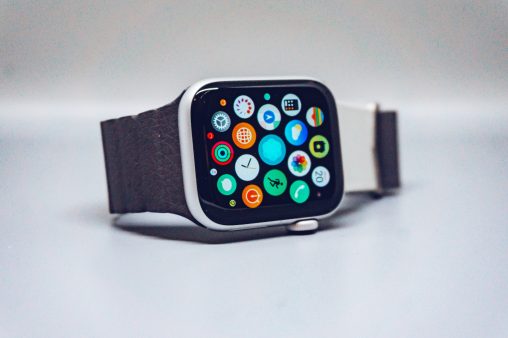Narrative Devices
20 February 2023
Memory plays an important role in shaping our sense of who and what we are. Our memories about ourselves – where we were born, where we grew up, the books we read as teenagers, the heartbreaks we have suffered – form part of the autobiographical narrative of who we understand ourselves to be. To lose our memories and our autobiographical narrative would be disorientating to say the least. Likely devasting. Just think of the film Memento.
Luckily, we do not need to rely solely on our biological memory to store our narratives. We use the world around us. Souvenirs, books, décor, paintings, photographs, diaries, tattoos. All store aspects of our narrative selves, reminding us of who we are – travellers, romantics, goths, maximalists, cooks, weight-lifters, and so on. Digital technology also helps us remember. GooglePhotos reminds us of the airport we were in this time last year and the beautiful hike the year before. GoodReads record the books we have read. Fitbits record our exercise routines.
We now carry around digital devices perfectly suited to recording, measuring, and reminding us of the minutiae of our lives. Not only do our phones hold photos, social media profiles, and calendars,self-tracking apps and devices, sometimes automatically, record our sleep cycles, our exercise regimes, our food intake, our weight, our citation rates, our moods, creating a dashboard of information about our bodies, our habits, and our selves. As Richard Heersmink puts it, distributing our narratives onto the world “allows us to remember our personal past in a way that is quite different from remembering our past without the aid of objects, allowing us to remember our personal past in a more reliable and detailed manner” (Heersmink 2020, 52, my italics).
We might think, then, with digital technology we have access to an increasingly personalised and specific log of who we are. One that is safe from the ravages of old age and protected from damage. But digital technologies are more than new storage devices for our memories. They can create, shape, even alter our self-narratives. And in potentially pernicious ways.
Digital devices do not just allow us to offload information about ourselves onto the world to be preserved. They create and provide us with new information about ourselves. Before my phone started counting my steps, I had no idea how far I walked each day. Now, as I smugly look at my weeks of completed 10,000-a-day step records, I have not distributed my narrative about being an active healthy person. The records create this narrative.
Surely providing new information from which to form narratives is helpful? It builds a richer picture of who we are. Yet, in furnishing us with data about our historic actions and bodily states and processes, digital devices can also mould the way that we understand and value ourselves. In supplying us with quantified measurements about our bodies and our activities, self-tracking devices promote quantified frameworks for self-understanding. Am I healthy? Let me check my step count. Am I clever? Let me check my google citation rate. Am I productive? Well, I’ve met my words-per-day writing achievement this week.
Indeed, my phone often tells me how to interpret the data it provides me – congratulating me on a pre-set BMI goal or a step-count achievement, chiding me for being lazy (looking at you Duolingo). The data comes pre-packaged in a narrative wrapper. It tells me what kind of a person I am. Our devices, then, do not just help us remember, they tell us what to remember and how.
But quantified data does not always ground accurate self-narratives – our high number of Twitter followers may give us the impression that we are popular yet work to mask our real loneliness. And as C. Thi Nguyen points out: “step counts are not the same as health, and citation rates are not the same as wisdom” (2021, 229). We also might worry that narratives that cannot be quantified, such as being a supportive colleague or a patient friend, fall out of the picture as we cannot log these in our digital devices. Digital devices might save us a lot of work by serving up narratives to us, but they might not tell us the real, or even the whole, story. And while we might rightly point out that we can simply ignore or deny the narratives our digital devices tell us, the whiff of objectivity that data gives off might make it difficult for us to let these tales go.
Distributing our narratives onto digital technology does not, then, necessarily give us more reliable self-narratives. Apps and devices that purport to track ourselves promote specific ways of interpreting and recording our activities and habits, thus shaping the kinds of narratives we form. We should, therefore, be mindful that while using digital devices for recording and storing aspects of our lives can be incredibly helpful, it could open us up to a kind of narrative railroading – where our digital devices encourage us to develop, focus on, and sustain certain self-narratives over others.
Our trepidation may deepen when we think about how designers of digital technology might benefit from this narrative railroading. The kinds of narratives that digital self-tracking devices typically promote often are underpinned by neo-liberal values (Lupton 2016). Our phones regularly nudge us to become fitter, healthier, and more productive. Perhaps this is not always a bad thing. But pushing these values can render us more exploitable workers and citizens. It also might drive a standardisation or homogenisation of narratives. A cynic could note that individuals with similar self-narratives are easy to predict and sell to – handy for any company. So perhaps we should be asking not only what narratives digital devices might promote but who might benefit from promoting them.
Narratives are not simply stories that we tell about ourselves, they are our selves. What we remember shapes who we are, influences how we act, what we desire and aim for, how we react and respond to situations. What we record matters. How matters too. Narratives have power and, when we hand over control of our narratives, we quite literally hand over power over our selves.
Bibliography
Heersmink, R. (2020). Narrative niche construction: Memory ecologies and distributed narrative identities. Biology & Philosophy, 35(5), 1-23.
Lupton, D. (2016). The quantified self. John Wiley & Sons.
Nguyen, C. T. (2021). The seductions of clarity. Royal Institute of Philosophy Supplements, 89, 227-255.
Photo by Simon Daoudi on Unsplash.
- July 2024
- June 2024
- May 2024
- April 2024
- March 2024
- February 2024
- January 2024
- December 2023
- November 2023
- October 2023
- September 2023
- August 2023
- July 2023
- June 2023
- May 2023
- April 2023
- March 2023
- February 2023
- January 2023
- December 2022
- November 2022
- October 2022
- September 2022
- August 2022
- July 2022
- June 2022
- May 2022
- April 2022
- March 2022
- February 2022
- January 2022
- December 2021
- November 2021
- October 2021
- September 2021
- August 2021
- July 2021
- June 2021
- May 2021
- April 2021
- March 2021
- February 2021
- January 2021
- December 2020
- November 2020
- October 2020
- September 2020
- August 2020
- July 2020
- June 2020
- May 2020
- April 2020
- March 2020
- February 2020
- January 2020
- December 2019
- November 2019
- October 2019
- September 2019
- August 2019
- July 2019
- June 2019
- May 2019
- April 2019
- March 2019
- February 2019
- January 2019
- December 2018
- November 2018
- October 2018
- September 2018
- August 2018
- July 2018
- June 2018
- May 2018
- April 2018
- March 2018
- February 2018
- January 2018
- December 2017
- November 2017
- October 2017
- September 2017
- August 2017
- July 2017
- June 2017
- May 2017

